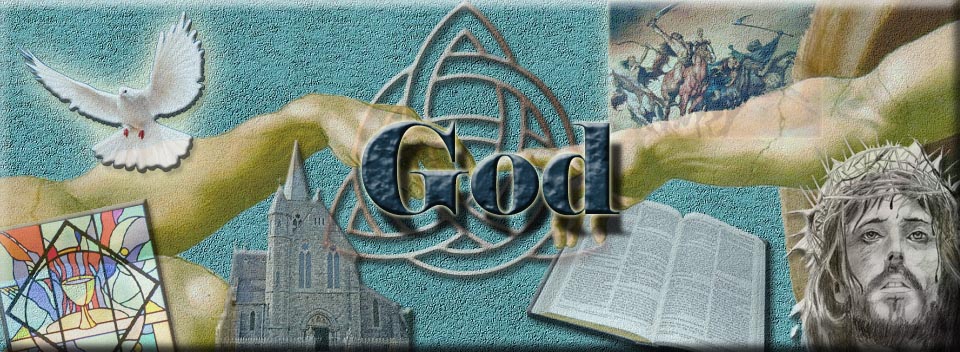
The Divine Names and Titles.
Parts X - XII.
By the Rev. Dr. Bullinger.
Taken from Things to Come Magazine, May, 1897
| X. — ELYŌN. The Most High God. עליוֹן This name is derived from the root עלה (Ah-lah) to be high, lofty, uppermost, over all. Hence, it is the title of God in Christ with reference to millennial rule as "God over all blessed for ever." An examination of the various occurrences will soon convince the student that this is the case. Its first occurrence is Gen. xiv. 18-24 in connection with Melchizedek, who was priest of "the most High God, the possessor of heaven and earth." This first occurrence fixes the meaning, and tells us that it has special relation to God as possessor of heaven and earth and subduing the enemies of His people. The priest of God in this revelation of His character blesses Abram with reference to the earth, and received tithes of the earth as its rightful owner and Lord. The first occurrence in the New Testament stands in connection with the same fact. To John the Baptist it was said, "And thou, child, shalt be called the prophet of the HIGHEST, for thou shalt go before the face of the Lord to prepare His way" (Luke i. 76). Again, in Deut. xxxii. 8, it was as "the Most High" that He divided to the nations "their inheritance." He, as "the possessor of heaven and earth" alone had the right and the power to do this. In Psa. lxxxix. 18, He is called " the Most High over all the earth," and in Psa. lxxxix. 27, He is "Most High or higher (A.V.), highest (R.V.) than the kings of the earth." Now, if the reader marks all the occurrences in his Bible, he will see how this thought throws its millennial light on the context. Gen. xiv. 18, 19, 20, 22. Numb. xxiv. 16. Deut. xxxii. 8. 2 Sam. xxii. 14. Psa. vii.; 17; ix. 2; xviii. 1 3; xxi. 7; xlvi. 4; xlvii. 2 1, 1 4; lvii. 2; lxxiii. 11; lxxvii. 10; lxxviii. 17, 35, 56; lxxxii. 6; lxxxiii. 18; lxxxvii. 5; lxxxix. 27; xci. 1, 9; xcii. 1; xcvii. 9; cvii. 11. Isa. xiv. 14. Lam. iii. 35, 38. Dan. vii. 18, 22, 25, 27. The title thus occurs thirty-six times (6 x 6 ot 62),1 twenty-two (2 x 11)* of which are in the Psalms.. Wherever it is used it has respect to power and blessing in the earth, and its first occurrence is associated with Melchizedek, King and Priest — Priest in connection, not with sacrifice, but with blessing and the Throne (compare Gen. xiv. 18 with Zech. xiv. 9), for "He shall be a Priest upon His Throne." In the days of the coming Kingdom this will be the one aspect of His character and His special millennial title. Priesthood and Royalty, blessing and power, will be the glory of His reign, when "the kingdom and dominion and the greatness of the kingdom under the whole heaven shall be given to the people of the saints of the Most High; whose kingdom is an everlasting kingdom, and all dominions shall serve and obey Him" (Dan. vii. 27). Closely connected with this title is XI. — "THE LORD OF ALL THE EARTH" OR OF THE WHOLE EARTH, which is used three times: Joshua iii. 11, 13 and Zech. vi. 5. It is first used when Joshua is taking possession of the land, and it will be the Lord's title when He takes possession. In each of the three instances it is in connection with Adon. Thus the special title corresponds with the special character. It tells of governmental power again assumed by the Captain of the Lord's hosts, when all power is given unto Him in heaven and in earth. It stands out in marked contrast to another title XII. — "THE GOD OF HEAVEN." This is His title now, while the Shechinah glory has left the earth, while the Lord no longer acts for His people Israel from between the cherubim, but has withdrawn from earth to heaven. He entered the land as "the Adon of all the earth"; but, on the dispersion of His people, Ezekiel saw the glory (the symbol of His presence) depart (Ezek. i.-xi.). Power was to be transferred to the Gentiles, and until He assumes it again "whose right it is," He reveals Himself by the title of the dispersion — as "the God of heaven." Twenty times and all in the five books of the captivity He is thus called. But when the time comes again for Him to fulfil Rev. xi., Zech. iv., and vi. 5, then He will do so as "the Adon of the whole earth." Then He will take unto Himself His great power; then His judgments will be poured forth. And when they are, men will cry out in fear; they will cry out to "the God of heaven" (Rev. xi. 13), willing enough for Him to keep at a distance. But it will be too late. "The Lord of the whole earth " will then have come as "the Most High, the possessor of heaven and earth," and the kingdoms of this world shall "become the kingdoms of our Lord and of His Christ (Messiah), and He shall reign for ever and ever."
Continued in Part 13
|
||
|
||
| 1) See, for the significance of these numbers, Numbers in Scripture, by the same author. Eyre and Spottiswoode.
|
-
Site Navigation
 Home
Home What's New
What's New Bible
Bible Photos
Photos Hiking
Hiking E-Books
E-Books Genealogy
Genealogy Profile
Free Plug-ins You May Need
Profile
Free Plug-ins You May Need
 Get Java
Get Java.png) Get Flash
Get Flash Get 7-Zip
Get 7-Zip Get Acrobat Reader
Get Acrobat Reader Get TheWORD
Get TheWORD

